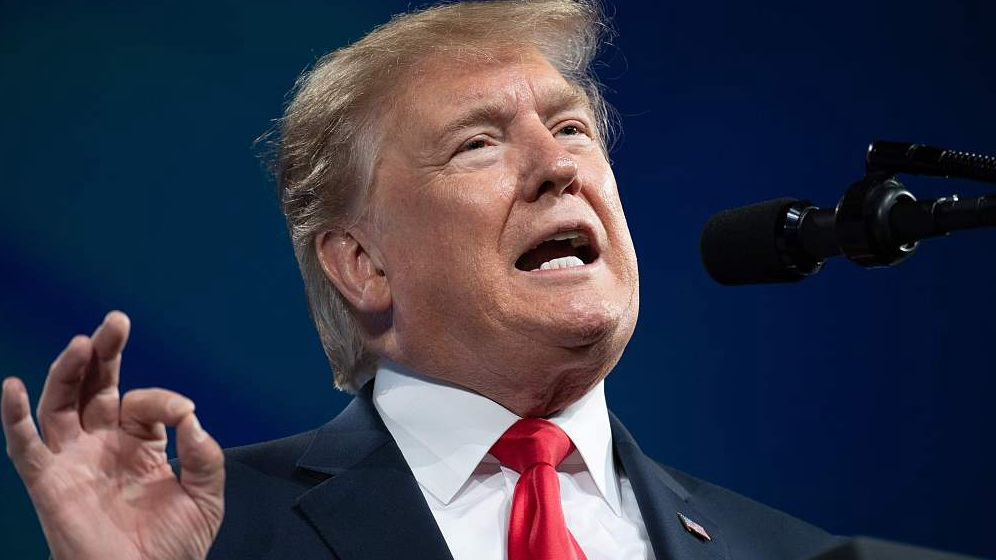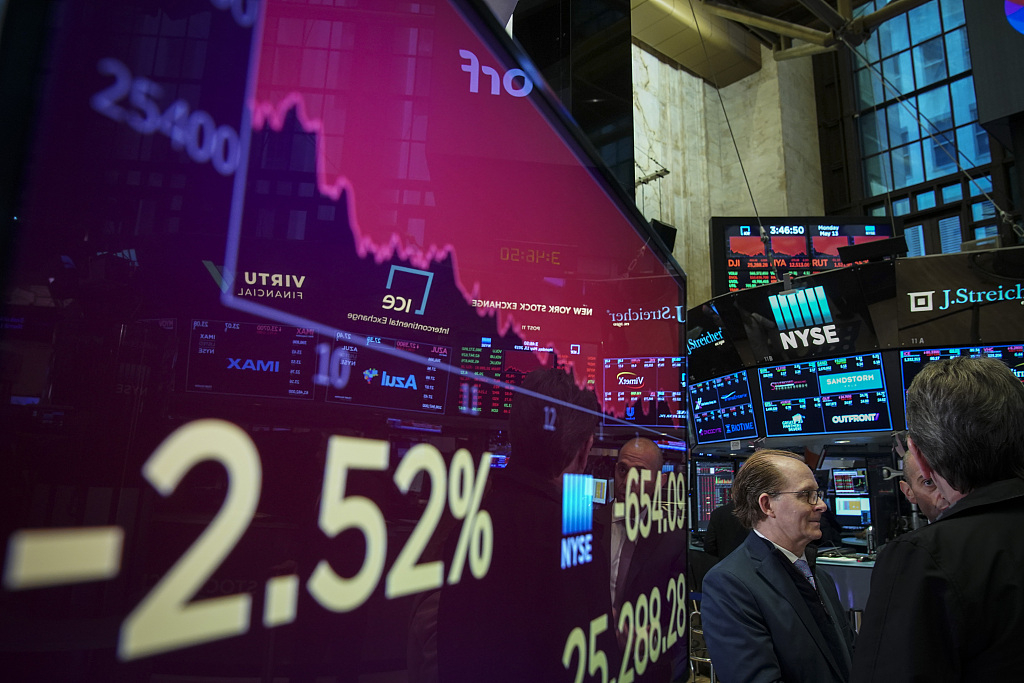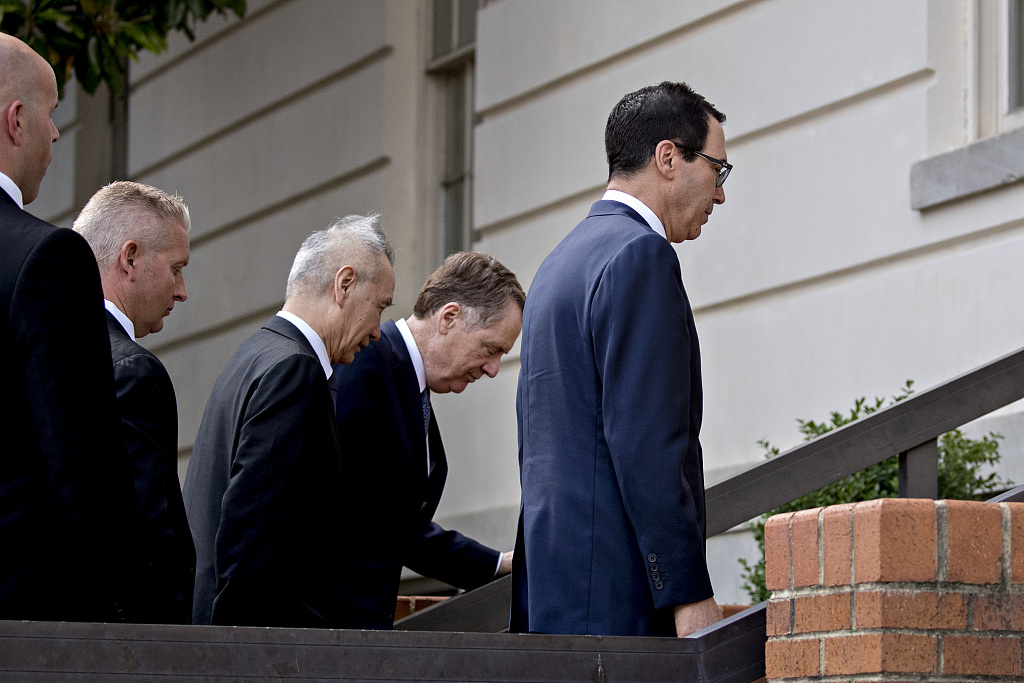
Opinion
20:43, 15-May-2019
No more self-deception over a delusional victory

Editor's note: This is an edited translation from an editorial initially published on People's Daily in Chinese on May 15, 2019.
In the lead-up to the 11th round of China-U.S. high-level trade talks, the U.S. announced its plan to raise tariffs on 200 billion U.S. dollar of Chinese imports from 10 percent to 25 percent, dealing a heavy blow to the talks.
To one's surprise, Washington also threw out a ridiculous theory of "higher tariffs, greater benefits" to mask its devastating impact on the U.S. economy. However, Americans don't buy it as they give a strong voice to oppose the tariff hikes.
From last year's "trade wars are good" to the recent and much-trumpeted claims that "China is paying huge amounts of tariffs…and these massive payments go directly to the Treasury of the U.S.", "tariffs will bring in far more wealth to our country than even a phenomenal deal of the traditional kind.
Also, "much easier & quicker to do", and "China would greatly slow down, and we would automatically speed up" … some U.S. officials seem to think that hiked tariffs are simply an easy catch, just like pennies from heaven. The tariffs would only harm China but leave the U.S. in one piece.
Some are even using it to create a false impression that the American economy is flourishing because of tariff rise. However, as international media put it, this is nothing more than another case of America "making a victory out of thin air".

A monitor displays the day's numbers as traders and financial professionals work ahead of the closing bell on the floor of the New York Stock Exchange (NYSE), May 13, 2019. /VCG Photo
A monitor displays the day's numbers as traders and financial professionals work ahead of the closing bell on the floor of the New York Stock Exchange (NYSE), May 13, 2019. /VCG Photo
According to studies at the National Bureau of Economic Research, an American research organization, additional tariffs imposed by the U.S. in 2018 on other countries and retaliatory countermeasures in return have cost the American economy 7.8 billion U.S. dollar and inflicted 68.8 billion U.S. dollar of annual losses on consumers and producers.
A report from the U.S. business consulting firm Trade Partnership Worldwide LLC shows that imposing 25 percent tariffs on 250 billion U.S. dollar worth of Chinese goods and raising levies on Chinese steel and aluminum will kill 934,000 U.S. jobs each year.
The UK-based newspaper Financial Times reported earlier that the American business community was frustrated as Washington persistently attempted to raise taxes on Chinese imports rather than seeking a conclusive trade deal.
Yet, the "higher tariffs, greater benefits" theory fabricates a different scenario: as imposing higher tariffs is like taking money from China for nothing, some Americans can easily reap the benefits. The reality, however, is the opposite.
American importers and retailers are not fully capable of absorbing the blow of tariff hikes and consumers would be the ones who eventually pay for it. The U.S. government hopes that companies could find alternative suppliers, but this is an idea that most businesses would shrug off.
For them, China is the only option because Chinese products are attractive in price and quality. The additional cost therefore could only be shifted onto consumers. Economists from the Federal Reserve Bank of New York, Princeton University and Columbia University have found that rising tariffs last year cost the U.S. consumers and importers 4.4 billion U.S. dollar every month and that the tariff revenue the U.S. collected is not enough to cover the losses to consumers incurred by more expensive imported products.
Taking money out of the consumer's wallet and portraying it as a windfall – who on earth could be persuaded?

Steven Mnuchin, U.S. Treasury secretary, from right, Robert Lighthizer, U.S. trade representative, and Liu He, China's Vice Premier, walk into the Office of the U.S. Trade Representative in Washington, D.C., U.S., Thursday, May 9, 2019. /VCG Photo
Steven Mnuchin, U.S. Treasury secretary, from right, Robert Lighthizer, U.S. trade representative, and Liu He, China's Vice Premier, walk into the Office of the U.S. Trade Representative in Washington, D.C., U.S., Thursday, May 9, 2019. /VCG Photo
In today's world, no country can have its own way. If America wants to impose tariffs on others, it will definitely be met with reaction and countermeasures. Rising tariffs are inflicting acute pains on the U.S economy, and many American farmers are having a hard time.
The Trump Administration created a 12 billion U.S. dollar bailout program last year to "make it up" to farmers. But compared with losses caused by rising costs and dwindling exports, it is just a drop in the ocean. "We can't take it any longer", American farmers and business owners are crying out for help, "for the past 10 months, America, not China, has been bearing the full cost of the trade war".
A statement recently made by Tariffs Hurt the Heartland, a lobby group representing over 150 American companies in industries including retailing, technology, manufacturing and farming, notes that "tariff increase will only punish the U.S. farmers, companies and consumers". However, policymakers in Washington have so far been deaf to these outcries.
It should be noted that the "higher tariffs, greater benefits" narrative is merely self-deceptive. The U.S. is playing a wrong card by attempting to solve trade frictions with China through raising tariffs and threats of sorts.
In the end, betting everything on tariffs might render all previous efforts futile. We simply offer a piece of advice here. If the U.S. is smart enough to secure its own interests, it should choose to head in the same direction with China and address relevant issues through negotiations in the spirit of equality and mutual respect.
(If you want to contribute and have specific expertise, please contact us at opinions@cgtn.com)

SITEMAP
Copyright © 2018 CGTN. Beijing ICP prepared NO.16065310-3
Copyright © 2018 CGTN. Beijing ICP prepared NO.16065310-3